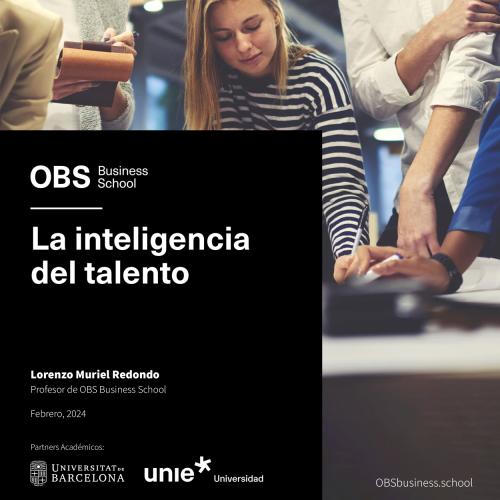
OBS Report: Talent Intelligence
Spain ranks 20th in Europe in terms of talent, behind Slovenia, Portugal and the Czech Republic
- The report proposes attracting talent from abroad, increasing spending on higher education and preventing brain drain.
- Other proposals include improving management-business relations, linking productivity and wages, enhancing employee development and synchronising secondary and tertiary levels of education with skills supply and demand, as well as increasing the use of technology.
March 2024. OBS Business School publishes the report The Intelligence of Talent, directed by Lorenzo Muriel, director of the Master in Management Coaching and Leadership at the school. The report analyses the new types of talent that have appeared in recent years and their relationship with new technologies, as well as the levers that will make this relationship viable when it is being questioned whether what we have understood until now as talent and the ways of attracting it, promoting it, searching for it and retaining it are the most appropriate.
In terms of talent, Spain is in 29th place out of 134 countries, and in 20th place if we only take the data for European countries, behind Slovenia, Portugal and the Czech Republic. To improve our position in this index, the report proposes opening up the entry of foreign talent to our country's universities and research and technology centres. It also proposes improving relations between government and business, increasing the use of technology, linking productivity with wages, increasing spending on higher education, boosting employee development and the use of social networks, consolidating the quality of business schools, promoting university rankings and university enrolment, taking measures to prevent the brain drain and synchronising secondary and tertiary education levels with the supply and demand of specialities.
In the last decades we have moved from the concept of fixed, long-term work to challenging, short-term work. Talent is no longer found in the same places or through the same tools as a few years ago. In fact, Artificial Intelligence is already helping to audit the skills required of employees, pre-screen candidates, provide personalised career development content and create career development paths based on individual goals and areas of interest.
But where does talent live today?
Companies must, on the one hand, find internal talent in a market with fewer working-age people and an ageing population. It is expected that by 2030 the five largest industrialised nations, China, Germany, the United States, the United Kingdom and Japan will have lost around 30 million people of working age. In Europe the proportion of people aged 65 and over out of those aged 15-64 will increase from 32% to 39.1%, and in Spain from 29.8% to 37.2%, especially in rural areas. Therefore, in order for companies to find that inner talent, they will have to define programmes to develop opportunities for employees, promote internal mobility, generate open roles and identify their critical needs.
On the other hand, there are the short-term workers, almost 78 million in 2023 compared to 43 million in 2018. Professionals who choose short-term or contract jobs, who tend to be highly skilled, focused on the mission and the project and quick to assimilate new environments. Hence their motivational levers lie in flexibility, the knowledge that they are using their skills to solve unique problems and the awareness that it is important for them to take breaks from the traditional corporate lifestyle. This leads to the creation of work teams that combine permanent employees with freelancers, short-term workers, project workers and consultants.
Today, talent (and this is another reality) can be located anywhere in the world and collaborate with a company through the hybrid work model. To identify the talent that best performs in these hybrid models, the OBS report considers it necessary to invest more and more efficiently in technology. And it recommends that companies clearly identify the skills they need, because they are likely to be in short supply. The predictions state that 14 G20 countries could lose $11.5 trillion in cumulative GDP growth due to worker skills shortages. Shortages are starting to become significant in markets such as Australia, Japan and Germany.
Another pool of talent is to be found today in the so-called green jobs, which are related to the renewables sector, savings and efficiency and networks and electrification, fields that are set to be a driving force for job creation and therefore for the demand for talent. According to a report by the Ministry of Ecological Transition, it is estimated that savings in energy bills will indirectly generate approximately 118,000 jobs by 2032.
The levers to find talent
The OBS report focuses on two key levers: training and coaching. In the area of training, new worker profiles have emerged that need to become specialists, workers who must adapt to technological, cultural or environmental changes, as well as those affected by the obsolescence of occupations. In Spain, 8.3% of companies already use some type of robot, a figure that rises to 26.3% among large companies. And the number of companies using AI technologies in our country is 9.6%, and reaches 40.7% among large companies. This gives an idea of the development opportunity that exists, as well as the possibilities for training. The strategies that companies will follow to obtain the necessary skills for the implementation of AI solutions involve training rather than external suppliers or the hiring of talent. An example is the 64% of companies in the financial sector and 71% in the manufacturing industry that have adopted AI solutions and provided training to their workforce.
The training of new professionals in technological fields such as AI, robotics, immersive reality or green jobs, as well as hybrid specialists such as experts in finance or law and artificial intelligence is becoming increasingly necessary. The report also considers it essential to train human resources departments to be more sensitive and effective in creating and supporting more diverse and intergenerational work teams, to increase the presence of teleworking and to create contexts where employee well-being and continuous innovation and learning stand out.
Coaching, on the other hand, is a tool not only for managers, but also for them to apply with their employees: the practice of coaching in manager-employee relationships.
Artificial intelligence and talent
The report highlights the importance of AI, but it must be clear that its future will depend on the quality of the relationships it has with humans. Joint collaboration undoubtedly delivers the best results, and to achieve this it is key to introduce AI progressively, making it clear that human judgement prevails when humans are confused or hesitant, and that AI should be as natural an extension as possible for people to work with. "Knowing about AI, changing the current threatening perception and being educated about it is necessary. Therefore, raising awareness among young people about the importance of computer and scientific skills for the future, promoting knowledge of nanotechnology and quantum computers and creating a healthy technological ecosystem, ranging from scientific research to the creation and implementation of the applications arising from it, are highly recommendable measures," concludes Lorenzo Muriel, professor at OBS Business School.
Content by:
Carmen García-Trevijano
OBS Business School Press Office

